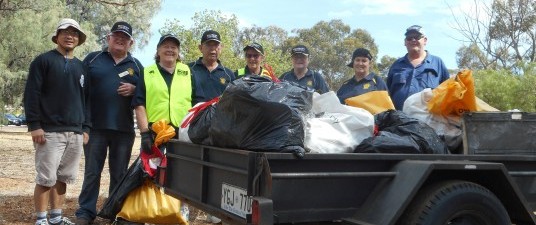Privacy Policy Statement
The Rotary Club of Elizabeth is committed to protecting individuals privacy and abides by the National Privacy
Principles [NPPs] contained within the Privacy Act. Privacy of your personal information is important to us and we
conduct Rotary Business with the highest standards of personal integrity.
We aim to provide the best possible programs whilst ensuring that you are aware of how your personal information is
used within our club, our members and contractors that are employed to facilitate or conduct our programs.
What information do we collect?
We will always be open and honest in our dealings with individuals and will only collect information about you that we
believe necessary to undertake our legitimate activities. The nature of the personal information we collect and the
degree to which it is used depends on the extent of the permission expressly given by you.
Privacy Policy
The personal information could be comprised of your name, address, date of birth, telephone number as well as your
qualifications and personal interests and only used specifically for the purposes to which you agree.
Why is the information collected and how is it used?
Generally, we collect information necessary to validate your identity and sometimes your qualifications and to ensure
your needs can be actioned efficiently and effectively. Collection of other personal information can also be made
depending on the nature of the activity in which you will be involved for the following reasons:
- To ensure your safety
- To administer medical assistance if or when necessary.
- To satisfy legal requirements.
- To ensure we do not by any inadvertent action or knowledge place you at harm
- To ensure we provide the service best suited for your needs
How do we collect the information?
In most cases, we only collect information about you, directly from you; however, there are instances where this is
impractical and information may be obtained personally from your referees.
What if you don’t want to provide certain personal information?
The Rotary Club of Elizabeth seeks only the information we believe necessary to undertake the purposes of our
programs and therefore, refusal to supply requested details may delay or prevent us from using your services or
satisfying your application to attend any program we maybe intending to run or sponsor.
Disclosure of Personal information
Any information collected by the Rotary Club of Elizabeth is kept strictly confidential and is only accessed by Rotary
Club of Elizabeth members or our service providers in the course of them undertaking their legitimate duties in
providing a given product or service. Only information for the particular function is shared.
Information you provide will not be given, rented, sold or traded to any external third party organisation and will only
be made available to an outside entity where we have contracted an external service provider (under strict privacy
terms) to assist in the execution of legitimate activities, OR if we act as an agent of another entity, OR if disclosure is
required by or authorised by law, OR if a you consent to the disclosure of specific information.
Accessing Personal Information
The Rotary Club of Elizabeth respects the rights of individual to access and correct their own personal information.
Requests to do so must be submitted in writing to the Board of the Rotary Club of Elizabeth P/O Box 233 Elizabeth SA
5112.
REVIEW DATE
The review date of this document will be December 2013 in the absence of any change in legislation, Australian
Standard or Code of Practice that affects this policy or where the Rotary Club of Elizabeth deem it necessary.
Harrassment Policy
PURPOSE
The Rotary Club of Elizabeth is committed to ensuring its members and visitors are not subjected to any
forms of harassment.
SCOPE
This document applies to all Members and Visitors.
LEGISLATION AND REFERENCE
- Commonwealth Age Discrimination Act 2004
- Australian Human Rights Commission Act 1986
- Commonwealth Disability Discrimination Act 1992
- Commonwealth Racial Discrimination Act 1975
- Commonwealth Sex Discrimination Act 1984
- Commonwealth OHS&W Act 1986
- South Australian Equal Opportunity Act 1984
DEFINITION
Harassment consists of unwelcome, offensive, abusive or threatening behaviour, including sexual
harassment and bullying. Harassment may include:
- Unwelcome physical contact
- Insulting or threatening language or gestures
- Continual unjustified comments about a person’s work or work capacity
- Jokes and comments about someone’s ethnic background, colour, race, or religion
- Offensive communications, such as pictures, posters, letters, e-mails
- Demeaning comments, insults, taunting, name calling or innuendos
- Deliberate withholding of important information
- Sabotaging of work, such as hiding documents, changing figures
- Exclusion from meetings or social events or not speaking to the victim
- Spreading gossip or false rumours
- Dangerous practical jokes or rituals
Harassment is NOT:
- Administrative action by those in authority
- Appropriate performance evaluation as a volunteer
- Consensual relationships
RESPONSIBILITIES
Every member is responsible for ensuring that harassment does not occur within the club meetings or any
other activity of the club. Any member becoming aware of any type of harassment must take the complaint
seriously and the Club President or appropriate delegate must be notified of all complaints immediately.
PROCEDURES
What can you do if you think you are being harassed?
- Tell the person that the behaviour is offensive, and ask for it to stop. This could be done alone, or with a friend or member for support.
- If the behaviour does not stop, or you feel unable to approach the person responsible for the harassment, seek advice from the club President. The president can help you look at your options and will support you in the action you decide you want to take.
- If necessary, make a formal complaint to the President or appropriate delegate who will deal with the matter seriously, quickly, impartially and confidentially.
- Assault is a criminal offence and victims are advised to report the offence to the police.
Making a Complaint
- Any member who believes that he/she is being harassed has the right to come forward and make a complaint to the Club President or appropriate delegate.
- While the Club would prefer to deal internally with complaints and is committed to doing so efficiently and sensitively, you may also lodge a complaint of harassment with the Equal Opportunity Commission.
Receiving a Complaint
- If a complaint has been made the Club President or appropriate delegate will proceed to investigate the matter in the manner requested by the complainant. The complainant may choose to bring another person to the interview. The President or appropriate delegate will get a broad outline of the grievance, then a systematic account.
- Accurate notes will be taken using the complainant’s own words where possible, these details will be checked with the complainant and his/her permission asked to proceed with the matter. The investigation will proceed promptly and confidentially.
Investigating the Complaint
- The President or appropriate delegate will interview the alleged harasser, separately and impartially. He/she will be told exactly what he/she has been accused of and will be given the opportunity to respond fully to the allegations.
- If appropriate, the Club President or appropriate delegate will interview any witness to the alleged incident(s). Accurate notes will be kept of all discussions regarding this matter.
Complaint Substantiated
- If the complaint has been substantiated both parties will be notified of the decision and the reasons for it.
- Immediate and appropriate steps will be taken to prevent the behaviour from recurring and, if appropriate, the harasser will be counselled and maybe requested to leave or request to leave the club.
- The complaint and its resolution along with any comments/response that the harasser wishes to make will be placed on the harasser’s club record files. These notes will remain on file for a predetermined time depending on the severity of the offence.
- If the person remains within the club after one month the Club President or appropriate delegate will check to see that, the behaviour has stopped and that the solution is working satisfactorily.
Complaint not Substantiated
- Where the investigation fails to substantiate the complaint, both parties will be informed explaining the finding.
- The complainant will be informed of his/her right to take the case to the Equal Opportunity Commission if dissatisfied.
VICTIMIZATION
- Victimisation is unlawful under the South Australian Equal Opportunity Act and the Commonwealth Sex Discrimination Act.
- If a person, in good faith, makes an enquiry or a complaint, the law makes it clear that there must be no victimisation of that person, or of anyone else who gave information about the complaint.
- Victimisation is treated very seriously and will not be tolerated.
REVIEW DATE
The review date of this document will be December 2013 in the absence of any change in legislation, Australian
Standard or Code of Practice that affects this policy or where the Rotary Club of Elizabeth deem it necessary.





